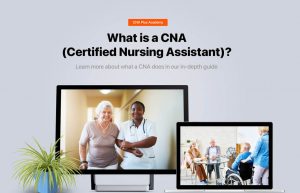Caregiver Burnout and Compassion Fatigue: How to Recognize and Avoid Them
There’s an irony at all levels of health care: Doing what you love can also wear you out. Every medical professional is at risk for two career side effects: Caregiver Burnout and Compassion Fatigue.
- Caregiver Burnout: Symptoms and Treatment
- What is it?
- What are the consequences if you’re affected?
- How can you tell if you have it?
- What can you do if you suspect you’re affected?
- Prevention
- Compassion Fatigue: Symptoms and Treatment
- What is it?
- What are the consequences if you’re affected?
- How can you tell if you have it?
- What can you do if you suffer from it?
- Prevention
Most people who choose a career in health care do so because they are passionate about helping others. They want to be at the patient’s bedside, they want to cure illnesses, they want to make lives better. There is nothing better, right?
But over time, every professional — from a lab technician to a neurosurgeon — may begin to feel the stress of constantly trying to support what seems to be an endless stream of patients. Each day brings new patients who require care. While it’s an honor to be part of their treatment, it can also take a toll on the health care professional.
Over time, every professional — from a lab technician to a neurosurgeon — may begin to feel the stress of constantly trying to support what seems to be an endless stream of patients.
Let’s talk about these two common conditions and what you can do to recognize them. Better yet, even avoid them!
Caregiver Burnout: Symptoms and Treatment
What is it?
Burnout (also known as “occupational burnout“) is a common term for the physical, mental, and emotional stress of one’s job. Healthcare professionals often experience ‘caregiver burnout‘: they become impatient and insensitive to the needs of their patients. They just go through the motions without feeling any satisfaction. Sharpening your practical skills with our CNA practice test can also be a way to stay engaged and competent in your role, mitigating some of these challenges.
What are the consequences if you’re affected?
Never take burnout lightly. It requires relief or treatment to deal with these consequences:
- Fatigue
- Anxiety
- Depression
- Negative impact on personal relationships
- Alcohol or drug abuse
- Medical issues: heart disease, high cholesterol, type 2 diabetes, stroke
- Lower immune response to illnesses
How can you tell if you have it?
Here are the common signs and symptoms:
- Physical: Gradually, you notice that it’s harder to get out of bed in the morning. Even when you’ve had a good night’s sleep, you’ll give anything for a nap. Maybe you start to develop headaches or stomach problems. Or you find you’re gaining or losing weight because your appetite has changed.
- Mental: You dread the end of your days off because you’ll have to go back to work the next day. The weekend is coming up, and you’re scheduled to work instead of going to the neighborhood cookout. And you can’t stand the fact that you have to return to that difficult resident who consumes your shift with endless demands. You can’t enjoy your time off because all you can think about is work.
- Emotional: No matter how much you do, it’s never enough. You feel overworked and underappreciated. The work is endless and no one cares, neither the RN nor the administrator. You used to enjoy answering call lights and helping residents, but now you’re sick of their constant demands.
What can you do if you suspect you’re affected?
Before you decide to change jobs, which may lead to the same burnout in a different location, try these tactics:
- Put yourself first. Are you doing more than your fair share of work? Are you picking up extra shifts because a co-worker called in sick? Look at how much you are doing and see if there is a way to cut back.
- Keep a journal. Every workday, take five minutes to write down three things you did that helped a patient or made a difference in someone’s life. This lets you get a better perspective on how important your work is. Maybe you just need to look at your part in the big picture.
- Look for patterns. Is there something that happens regularly that drives you crazy? Are there thankless tasks you hate or certain situations that are frustrating? It may not be specific patients or colleagues but types of personalities that bother you. Just knowing your triggers can be useful because you can plan what to do. Talk to a supervisor. You aren’t the first CNA to encounter this problem.
- Time for an in-house change? Consider whether you need a different kind of patient or setting: rehabilitation rather than nursing homes, or obstetrics rather than oncology. Or maybe you’re just ready for the next level of your career.
Prevention
Remember that saying, “An ounce of prevention is worth a pound of cure.” From your first day as a CNA onward, try to keep a work-life balance. Sure, you’re thrilled and excited about your new career, but be cautious about doing too much at your job while leaving your personal life behind.
- Stay invested in your family and friends. You will be working on weekends and holidays, but make an effort to keep up with the important people in your life.
- Exercise is essential! It keeps you healthy and helps your body rid itself of the stress toxins that are part of daily life. Find the best time for exercise and make it part of your calendar.
- Look at your work environment. Some places are more supportive than others. If you are in a place where co-workers gossip and blame or don’t share the workload, your job may not be a good fit for you. If the employer’s values don’t match yours, it may be time to seek another job.
Compassion Fatigue: Symptoms and Treatment
What is it?
Compassion fatigue is a special kind of burnout that happens to caregivers. It’s the result of ongoing care of patients who are experiencing illness or extreme stress. Because you are empathetic, you may internalize some of their suffering and emotions. Over time, you can begin to feel overwhelmed or numb to the needs of your patients.
What are the consequences if you’re affected?
Compassion fatigue can affect both your professional and personal lives. It can cause the following:
- Decreased quality of patient care
- Increased absenteeism
- Inability to care for or nurture at work or at home
- Lack of enjoyment of things that used to be pleasant
How can you tell if you have it?
In addition to the burnout symptoms listed earlier, compassion fatigue can cause the following:
- Poor self-esteem
- Feelings of annoyance or anger
- Disconnection from patients
- Less tolerance of others
- Less compassion for others
What can you do if you suspect you suffer from it?
The good news is that once you recognize compassion fatigue, you can deal with it faster than with burnout. A few actions can get you back in balance:
- Take mini-breaks. Compassion fatigue is different from burnout because you can find pleasure in small chunks of time, enjoying things that make you happy.
- Think about the meaning of your work. Caring for seriously impaired, dying, or chronically ill patients is worthwhile. Step back and recognize that you are contributing to the greater good of many personal lives.
- Return to what makes you feel happy in your own life. Be grateful for your family and friends. Exercise to keep your health.
- Seek a mentor or therapist if you need assistance.
Prevention
Compassion fatigue can be unpredictable. It occurs more quickly than burnout, so you should try to avoid it by the following techniques:
- Talk to people you trust. You can’t discuss individual patients (HIPAA rules are quite strict about that), but you can describe how you’re feeling about your work and the daily stresses of your job. Co-workers can understand, and so can your supervisor.
- Set boundaries with patients and families. This does not mean that you stop caring! You will still empathize but without taking on their situation. You simply can’t add one case on top of another, on top of another… Do what is needed to be present and available, but don’t take it home with you.
- “Put on your own oxygen mask first.” Just as in an airline’s emergency procedures, you must tend to your own air supply before you can help anyone else. Simply put, you can’t fix everything. Do what you can during your shift, and when you leave, know that you have done your best.
- Know yourself. We all have times when we are better able to handle stress than at other times. If you have a lot going on in your personal life, you will have less energy to invest in needy patients. Recognize what your limits and current personal demands are and create a way to balance work and home. This doesn’t mean that you’ll care less about your patients but that you are figuring out how best to serve them in the long run.
The best thing you can do for yourself, your family, and your patients is to look out for the warning signs.
You began your CNA career, eager and passionate about what you do. To keep feeling that way for many years, take care of yourself and watch for any signs that could hurt your enthusiasm. If you notice anything, don’t wait to ask for help or support. We want you to have a long and successful career!
 By
By 



